|
|
|
Sort Order |
|
|
|
Items / Page
|
|
|
|
|
|
|
| Srl | Item |
| 1 |
ID:
025113
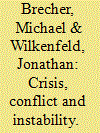

|
|
|
|
|
| Publication |
Oxford, Pergamon Press, 1989.
|
| Description |
xiv, 275p.
|
| Standard Number |
0080365027
|
|
|
|
|
|
|
|
|
|
|
|
Copies: C:1/I:1,R:0,Q:0
Circulation
| Accession# | Call# | Current Location | Status | Policy | Location | IssuedTo | DueOn |
| 032805 | 327.0904/BRE 032805 | Main | Issued | General | | A1163 | 16-May-2024 |
|
|
|
|
| 2 |
ID:
132324
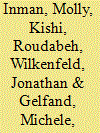

|
|
|
|
|
| Publication |
2014.
|
| Summary/Abstract |
In order to assess the impact of culture on state behavior in international crises, specifically with regard to mediation and its outcome, this study tests hypotheses rooted in both the international relations and the cross-cultural psychology literatures, implementing analysis at both the international-system level and the domestic-state-actor level. At the international system level, the study finds that cultural difference between adversaries affects whether or not mediation occurs during an international crisis but has no effect on tension reduction. At the domestic state actor level, we find that there are certain facets of cultural identity that make a state more or less open to requesting or accepting third-party mediation during an international crisis, but that these facets have no effect on tension reduction.
|
|
|
|
|
|
|
|
|
|
|
|
|
|
|
|
| 3 |
ID:
120768
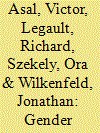

|
|
|
|
|
| Publication |
2013.
|
| Summary/Abstract |
This article explores those factors that shape a political organization's choice of tactics in political mobilization with a particular focus on the influence of gender ideology on the choice of different type of contentious action. To understand why political organizations engaging in contentious politics choose to employ violent tactics, nonviolent tactics, or a mixture of both, current scholarship has tended to focus on factors such as relationship with the government, external support, and religious or leftist ideology. Far less attention has been given to the role of an organization's ideology relating to gender when predicting its behavior. In addition, much of the analysis of contentious activity has analyzed the use of violence or protest separately and rarely examines the choice of a mixed strategy. We employ a time-series multinomial logistic regression analysis to examine the Middle East Minorities at Risk Organizational Behavior dataset (MAROB), including data over 24 years on 104 ethno-political organizations that have used a range of tactics including protest, violence, and/or a mix of the two, to investigate organizational and state-level variables that lead organizations to choose different strategies. We find that a number of variables can influence a movement's choice to engage in one strategy over another. Gender-inclusive ideology makes an organization more likely to engage in protest and less likely to choose a violent or mixed strategy.
|
|
|
|
|
|
|
|
|
|
|
|
|
|
|
|
| 4 |
ID:
157514
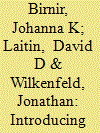

|
|
|
|
|
| Summary/Abstract |
The article introduces the All Minorities at Risk (AMAR) data, a sample of socially recognized and salient ethnic groups. Fully coded for the forty core Minorities at Risk variables, this AMAR sample provides researchers with data for empirical analysis free from the selection issues known in the study of ethnic politics to date. We describe the distinct selection issues motivating the coding of the data with an emphasis on underexplored selection issues arising with truncation of ethnic group data, especially when moving between levels of data. We then describe our sampling technique and the resulting coded data. Next, we suggest some directions for the future study of ethnicity and conflict using our bias-corrected data. Our preliminary correlations suggest selection bias may have distorted our understanding about both group and country correlates of ethnic violence.
|
|
|
|
|
|
|
|
|
|
|
|
|
|
|
|
| 5 |
ID:
065056
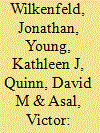

|
|
|
|
|
| Publication |
London, Routledge, 2005.
|
| Description |
x, 235p.
|
| Standard Number |
0415700671
|
|
|
|
|
|
|
|
|
|
|
|
Copies: C:1/I:0,R:0,Q:0
Circulation
| Accession# | Call# | Current Location | Status | Policy | Location |
| 049979 | 327.17/WIK 049979 | Main | On Shelf | General | |
|
|
|
|
| 6 |
ID:
065770
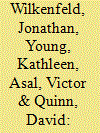

|
|
|
| 7 |
ID:
102298
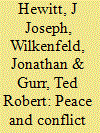

|
|
|
|
|
| Publication |
Boulder, Paradigm Publishers, 2010.
|
| Description |
iv, 156p.
|
| Standard Number |
9781594517150, hbk
|
|
|
|
|
|
|
|
|
|
|
|
Copies: C:1/I:0,R:0,Q:0
Circulation
| Accession# | Call# | Current Location | Status | Policy | Location |
| 055780 | 303.6/HEW 055780 | Main | On Shelf | General | |
|
|
|
|
| 8 |
ID:
137031
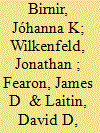

|
|
Socially relevant ethnic groups, ethnic structure, and AMAR
/ Birnir, Jóhanna K; Wilkenfeld, Jonathan ; Fearon, James D ; Laitin, David D, Gurr, Ted Robert, Brancati, Dawn Saideman, Stephen M, Pate, Amy, Hultquist, Agatha S
|

|
|
|
|
| Summary/Abstract |
Protracted conflicts over the status and demands of ethnic and religious groups have caused more instability and loss of human life than any other type of local, regional, and international conflict since the end of World War II. Yet we still have accumulated little in the way of accepted knowledge about the ethnic landscape of the world. In part this is due to empirical reliance on the limited data in the Minorities at Risk (MAR) project, whose selection biases are well known. In this article we tackle the construction of a list of ‘socially relevant’ ethnic groups meeting newly justified criteria in a dataset we call AMAR (A for All). We find that one of the principal difficulties in constructing the list is determining the appropriate level of aggregation for groups. To address this issue, we enumerate subgroups of the commonly recognized groups meeting our criteria so that scholars can use the subgroup list as one reference in the construction of the list of ethnic groups most appropriate for their study. Our conclusion outlines future work on the data using this expanded dataset on ethnic groups.
|
|
|
|
|
|
|
|
|
|
|
|
|
|
|
|
|
|
|
|
|